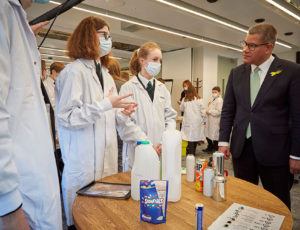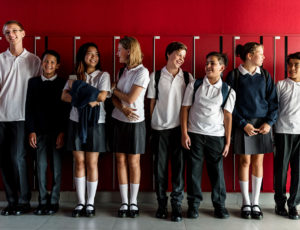
The Department for Education launches its Sustainability and Climate Change Strategy, including the launch of a new natural History GCSE.
Secondary school students will be able to study the natural world through a new GCSE in natural history to be introduced by September 2025. It forms part of new plans announced by Education Secretary Nadhim Zahawi, detailing how the UK education sector is to become a world leader in climate change by 2030, as part of the launch of the government’s flagship Sustainability and Climate Change Strategy.
The new natural history qualification will enable young people to explore the world by learning about organisms and environments, environmental and sustainability issues, and gain a deeper knowledge of the natural world around them. They will also develop the skills to help them carve a future career in the natural world if they wish to. For example, observation, description, recording and analysis, through sustained and structured field study.
The government will also confirm its plans to accelerate the rollout of carbon literacy training to support at least one sustainability lead in every locally maintained nursery, school, college and university.
The training will support settings to develop climate action plans that will bring together and drive activity to improve climate education, put in place measures to protect them against the effects of climate change, and increase climate resilience through adaptation initiatives. Plus, the Education Secretary will pledge greater support for teaching climate change at all levels. By 2023, there will be new requirements for further education teachers to build sustainability into their teaching.
Young people will also be able to bolster their environmental education gained in existing subjects, including changes to landscapes and urbanisation in geography, and habitats and ecosystems in science.
Commenting is Education Secretary Nadhim Zahawi.
“We are delivering a better, safer, greener world for future generations and education is one of our key weapons in the fight against climate change. The entrepreneurial, can-do spirit of this country makes me confident that we will win this fight.
“It shouldn’t come as a surprise to anyone that young people are already very committed to a more sustainable planet. We should be proud of this, and I want to do everything I can to encourage this passion so they can be agents of change in protecting our planet.
“The new natural history GCSE will offer young people a chance to develop a deeper knowledge and understanding of this amazing planet, its environment and how we can come together to conserve it.”
The measures are expected to build on the government’s pledge for every new school, and delivered under the department’s school rebuilding programme, to be cleaner, greener and net-zero in operation. The rollout of ultra-low carbon education buildings will also be accelerated. By 2025, at least four schools and one college will have been built via the Gen Zero Platform that the department demonstrated at COP26.
The strategy also details the development of additional measures first announced at COP26.
This includes the National Education Nature Park, which will help children and young people get more involved in the natural world. It will help increase biodiversity in the grounds of their nursery, school, or college. For example, by installing bird feeders and ‘bug hotels’. Teachers will also be provided with free, high-quality climate education resources as part of the Nature Park hub.
Finally, children and young people will be able to undertake a new Climate Award in recognition of their work to improve their environment, with a prestigious national awards ceremony held every year. The Climate Leaders Award will help children and young people develop their skills and knowledge in biodiversity and sustainability and celebrate and recognise their work in developing their skills and knowledge.









